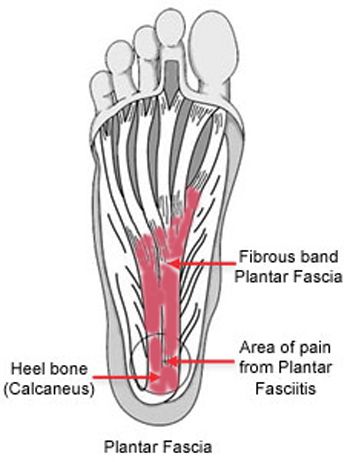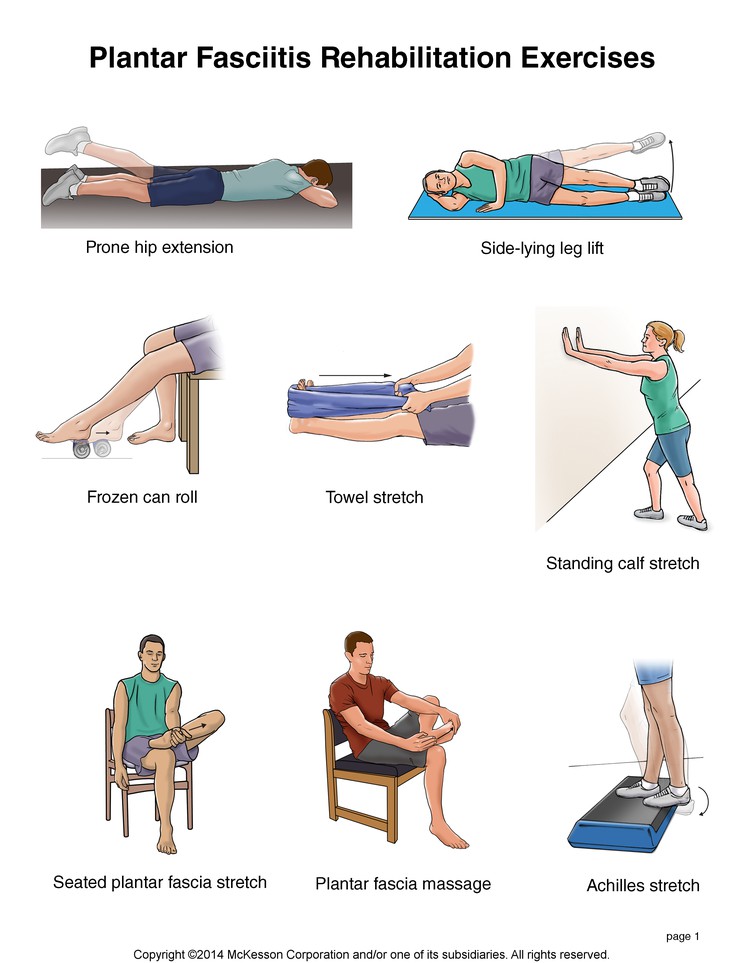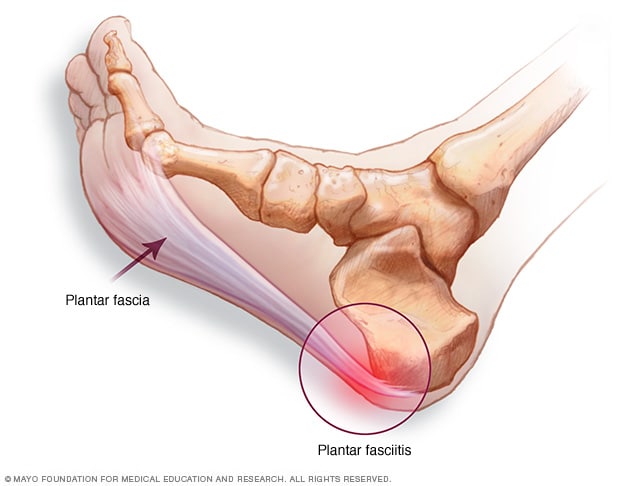Plantar Fasciitis
How do you get plantar fasciitis?

Compression type plantar fascia injuries have a traumatic history. Landing on a sharp object that bruises your plantar fascia is your most likely trauma.
The location of plantar fasciitis pain will be further under your arch than under your heel, which is more likely to be a fat pad contusion if a single trauma caused your pain. The compression type plantar fasciitis can confused with a fat pad contusion that is often described as a "stone bruise".
What are the symptoms of plantar fasciitis?
It will generally get better as you warm up. From there it generally starts progressing
You'll typically first notice early plantar fasciitis pain under your heel or in your foot arch in the morning or after resting.
Your heel pain will be worse with the first steps and improves with activity as it warms up.
Plantar fasciitis generally progresses as follows
- Pain on waking
- Pain after exercise and 1
- Pain before exercise, 1 and 2.
- Pain during exercise, 1,2 and 3.
- Pain all the time including at rest
Ultimately, further trauma and delayed healing will result in the formation of calcium (bone) within the plantar fascia. When this occurs adjacent to the heel bone it is known as heel spurs, which have a longer rehabilitation period.
How do you help plantar fasciitis?
Should I get a cortisone injection if my heel hurts?
If your plantar fasciitis continues after a few months of conservative treatment, your doctor may suggest to inject your heel with steroidal anti-inflammatory medications (corticosteroid). Cortisone injections have been shown to have short-term benefits but they actually retard your progress in the medium to long-term, which usually means that you will suffer recurrent bouts for longer.
Due to poor foot biomechanics being the primary cause of your plantar fasciitis it is vital to thoroughly assess and correct your foot and leg biomechanics to prevent future plantar fasciitis episodes or the development of a heel spur.
Your physiotherapist is an expert in foot assessment and its dynamic biomechanical correction. They may recommend one of many treatment courses depending on your history, level of pain and response to treatment.
How do I get better?
or
Click here to find out more about our physiotherapy services
or
Click here to meet our team
The Ultimate Guide to Plantar Fasciitis Treatment by Physio Labs
Introduction
Are you suffering from the excruciating pain of plantar fasciitis? Do you find it challenging to take those first steps in the morning due to the stabbing sensation in your heel? If so, you're not alone. Plantar fasciitis is a common foot condition that can affect anyone, but with the right treatment, you can get back on your feet pain-free. In this comprehensive guide, we'll explore the world of plantar fasciitis treatment, focusing on the expertise offered by Physio Labs.
Understanding Plantar Fasciitis
What Is Plantar Fasciitis?
Plantar fasciitis is a condition that occurs when the thick band of tissue (the plantar fascia) that runs across the bottom of your foot becomes inflamed. This inflammation leads to heel pain, which can be sharp and debilitating.
Causes of Plantar Fasciitis
- Overuse: Excessive strain on the feet, often caused by activities like running or standing for prolonged periods.
- Foot Structure: Flat feet or high arches can increase the risk of developing plantar fasciitis.
- Improper Footwear: Wearing shoes with inadequate support or cushioning.
- Age: It's more common in people between the ages of 40 and 60.
- Obesity: Carrying excess weight puts additional stress on the plantar fascia.
Physiotherapy Treatment for Plantar Fasciitis
The Role of Physio Labs
Physio Labs is a renowned center for physiotherapy that specializes in treating plantar fasciitis. Their team of expert physiotherapists uses a holistic approach to alleviate pain and promote healing.
Evaluation and Diagnosis of heel pain and heel spurs
When you visit Physio Labs, the first step is a thorough evaluation of your condition. This may include gait analysis, physical examination, and diagnostic imaging to determine the extent of damage to the plantar fascia to determine the cause of heel pain. This allows the Physio to tailor the treatment of your plantar fasciitis.
Diagnosing Plantar Fasciitis
Accurate diagnosis is essential for developing an effective treatment plan.
Clinical Evaluation
Physicians may perform a physical examination, evaluating your foot's range of motion and identifying areas of tenderness. This will allow you physio to determin the cause of your heel pain
Imaging Studies
X-rays or MRI scans may be ordered to rule out other conditions and assess the extent of tissue damage.
Biomechanical Assessment
Understanding your foot's biomechanics can help tailor treatment to your specific needs.
Individualized Treatment Plans
- Stretching Exercises: Physiotherapists at Physio Labs will design a personalized stretching routine to improve the flexibility of your plantar fascia and calf muscles.
- Strengthening Exercises: Building strength in the muscles that support the arch of your foot can help relieve pressure on the plantar fascia.
- Manual Therapy: Techniques like deep tissue massage and myofascial release can provide immediate relief from pain.
- Orthotic Devices: Custom orthotics can correct foot imbalances and reduce strain on the plantar fascia.
- Shockwave Therapy: In some cases, shockwave therapy may be recommended to stimulate the healing process.
Lifestyle Modifications
Footwear Recommendations
Wearing the right shoes is crucial in managing plantar fasciitis. Physio Labs can offer guidance on selecting footwear with proper arch support and cushioning, as well as one of the most common pain relief treatments night splints.
Activity Modification
To prevent further injury, Physio Labs may suggest modifications to your daily activities, including temporary rest from high-impact exercises. to deload the chronic heel pain and not overload the achilles tendon or bone spurs.
Causes of Plantar Fasciitis and Preventing Plantar Fasciitis Recurrence
Education and Self-Care
At Physio Labs, patient education is paramount to understand the cause of your hell pain. You'll learn techniques for self-care, including stretching and icing, to manage pain and prevent recurrence.
Understanding the Anatomy
To comprehend plantar fasciitis, it's crucial to grasp the anatomy of the foot. The plantar fascia plays a vital role in foot biomechanics, providing support to the arch and assisting with weight distribution.
Symptoms of Plantar Fasciitis
Recognizing the symptoms of chronic plantar fasciitis is crucial for early intervention and effective treatment.
Heel Pain
The hallmark symptom is a sharp, stabbing plantar heel pain in the heel bone, typically experienced with the first steps in the morning or after prolonged periods of rest.
Pain During Activities
Pain often intensifies during activities that stress the foot, such as walking, running, or climbing stairs.
Swelling and Tenderness
Swelling and tenderness may be present along the arch of the foot.
Treating Plantar Fasciitis
Effective treatment is essential to alleviate pain and promote healing.
Conservative Measures
Conservative treatments include rest, ice, stretching exercises, and the use of orthotic devices to provide support.
Physical Therapy
Physical therapy can help improve foot strength and flexibility, addressing the root causes of plantar fasciitis.
Medical Interventions
In severe cases, medical interventions such as corticosteroid injections or shockwave therapy may be recommended.
Conclusion
In conclusion, plantar fasciitis can be a painful and limiting condition, but with the expert care provided by Physio Labs, you can regain your mobility and live pain-free. Don't let plantar fasciitis hold you back from enjoying life to the fullest.
FAQs
How long does it take to see improvement with physiotherapy for plantar fasciitis?
The timeframe varies from person to person, but many individuals experience significant relief within a few weeks of starting treatment at Physio Labs.
Is surgery necessary for plantar fasciitis treatment?
Surgery is typically considered a last resort if conservative treatments, like those offered at Physio Labs, do not provide relief.
Can I continue exercising with plantar fasciitis?
Physiotherapists at Physio Labs can help modify your exercise routine to prevent further damage while still allowing you to stay active.
Are orthotic devices covered by insurance?
Many insurance plans do cover custom orthotics prescribed by a physiotherapist. It's advisable to check with your insurance provider for specific details.
Is plantar fasciitis a chronic condition?
In most cases, plantar fasciitis can be effectively treated, and with proper care, recurrence can be minimized. However, it's important to follow the guidance of your physiotherapist to maintain foot health.
Can plantar fasciitis go away on its own?
In some cases, mild plantar fasciitis may resolve with rest and self-care. However, chronic cases often require intervention.
Are there exercises that can help with plantar fasciitis?
Yes, stretching exercises, calf stretches, and toe stretches can alleviate symptoms and improve flexibility.
How long does it take to recover from plantar fasciitis?
Recovery time varies, but with proper treatment, most individuals experience significant relief within a few months.
Can I continue to exercise with plantar fasciitis?
Moderate, low-impact exercises like swimming and cycling can be beneficial, but high-impact activities should be avoided during the acute phase.
Is surgery necessary for plantar fasciitis?
Surgery is typically considered a last resort when conservative treatments fail to provide relief.
How can I prevent plantar fasciitis from recurring?
Maintaining proper foot care, wearing supportive shoes, and incorporating foot-strengthening exercises into your routine can help prevent recurrence.
Can I prevent plantar fasciitis?
Yes, you can reduce the risk by wearing supportive footwear, maintaining a healthy weight, and stretching regularly.
Are there any home remedies for plantar fasciitis?
Yes, you can try home remedies like rolling a frozen water bottle under your foot or using arch-supporting inserts.
Can I continue exercising with plantar fasciitis?
Low-impact exercises like swimming or cycling are usually better during recovery, but consult your physiotherapist for guidance.
Is surgery the only option for severe cases?
No, surgery is a last resort. Many non-invasive treatments can effectively manage severe cases.
Can plantar fasciitis come back after treatment?
Yes, it can recur if you don't follow preventive measures and lifestyle changes.
References
-
WebMD - Plantar Fasciitis Overview
- URL: https://www.webmd.com/pain-management/what-is-plantar-fasciitis
- Why: WebMD is a reputable medical resource known for providing accurate and reliable health information. This page offers an overview of plantar fasciitis, its symptoms, causes, and treatment options. Linking to it can enhance the trustworthiness of your content.
-
Mayo Clinic - Plantar Fasciitis
- URL: https://www.mayoclinic.org/diseases-conditions/plantar-fasciitis/symptoms-causes/syc-20354846
- Why: Mayo Clinic is a renowned medical institution, and this page provides in-depth information about plantar fasciitis, including its causes, symptoms, and treatment. It's a highly authoritative source for medical content.
-
American Academy of Orthopaedic Surgeons - Plantar Fasciitis
- URL: https://orthoinfo.aaos.org/en/diseases--conditions/plantar-fasciitis/
- Why: The American Academy of Orthopaedic Surgeons is a respected organization in the field of orthopedics. This page offers detailed information about plantar fasciitis, its diagnosis, and various treatment options. It's a trustworthy source for medical information.
-
PubMed - Plantar Fasciitis Research Articles
- URL: https://pubmed.ncbi.nlm.nih.gov/
- Why: PubMed is a database of peer-reviewed medical research articles. You can link to specific research studies or articles related to plantar fasciitis to add a scholarly dimension to your content. Ensure that the articles you link to are relevant and authoritative.
-
National Institute of Arthritis and Musculoskeletal and Skin Diseases (NIAMS) - Plantar Fasciitis
- URL: https://www.niams.nih.gov/health-topics/plantar-fasciitis
- Why: NIAMS is a part of the National Institutes of Health (NIH) and is dedicated to research and information about musculoskeletal and skin diseases. This page provides information on plantar fasciitis, its causes, symptoms, and treatment options, making it a credible source for medical content.
-
Better Health Channel - Plantar Fasciitis
- URL: https://www.betterhealth.vic.gov.au/health/conditionsandtreatments/plantar-fasciitis
- Why: Better Health Channel is a government-funded health information resource in Victoria, Australia. It provides reliable and evidence-based information on various health topics, including plantar fasciitis. Linking to this source can enhance the trustworthiness of your content for Australian audiences.
-
Healthdirect Australia - Plantar Fasciitis
- URL: https://www.healthdirect.gov.au/plantar-fasciitis
- Why: Healthdirect Australia is a government initiative that offers authoritative health information and advice to Australians. This page provides comprehensive information about plantar fasciitis, making it a credible source for your content.
-
Royal Australian College of General Practitioners (RACGP) - Plantar Fasciitis
- URL: https://www.racgp.org.au/clinical-resources/clinical-guidelines/key-racgp-guidelines/view-all-racgp-guidelines/plantar-fasciitis
- Why: RACGP is a professional organization representing general practitioners in Australia. Their clinical guidelines on plantar fasciitis are a valuable resource for medical information. Linking to RACGP adds authority to your content.
-
Arthritis Australia - Plantar Fasciitis
- URL: https://arthritisaustralia.com.au/types-of-arthritis/heel-pain-and-plantar-fasciitis/
- Why: Arthritis Australia is a trusted source for information on various musculoskeletal conditions, including plantar fasciitis. This page specifically addresses heel pain and plantar fasciitis, making it relevant and trustworthy for your content.
-
Australian Podiatry Association - Plantar Fasciitis
- URL: https://www.podiatry.org.au/about-podiatry/foot-conditions/plantar-fasciitis
- Why: The Australian Podiatry Association is the peak professional body representing podiatrists in Australia. Their page on plantar fasciitis offers insights from foot health experts, adding credibility and expertise to your content.

References
- Gollwitzer H, Diehl P, von Korff A, Rahlfs VW, Gerdesmeyer L. Extracorporeal shock wave therapy for chronic painful heel syndrome: a prospective, double blind, randomized trial assessing the efficacy of a new electromagnetic shock wave device. J Foot Ankle Surg 2007;46:348-57.
- Gerdesmeyer L, Frey C, Vester J, et al. Radial extracorporeal shock wave therapy is safe and effective in the treatment of chronic recalcitrant plantar fasciitis: results of a confirmatory randomized placebo-controlled multicenter study. Am J Sports Med 2008;36: 2100-9.
- Ibrahim MI, Donatelli RA, Schmitz C, Hellman MA, Buxbaum F. Chronic plantar fasciitis treated with two sessions of radial extracorporeal shock wave therapy. Foot Ankle Int 2010;31:391-7.
- Marks W, Jackiewicz A, Witkowski Z, Kot J, Deja W, Lasek J. Extracorporeal shock-wave therapy (ESWT) with a new-generation pneumatic device in the treatment of heel pain. A double blind randomised controlled trial. Acta Orthop Belg 2008;74:98-101.
- Radwan YA, Mansour AM, Badawy WS. Resistant plantar fasciopathy: shock wave versus endoscopic plantar fascial release. Int Orthop 2012;36:2147-56.
- Rompe JD, Decking J, Schoellner C, Nafe B. Shock wave application for chronic plantar fasciitis in running athletes. A prospective, randomized, placebo-controlled trial. Am J Sports Med 2003;31:268-75.
- Speed CA, Nichols D, Wies J, et al. Extracorporeal shock wave therapy for plantar fasciitis. A double blind randomised controlled trial. J Orthop Res 2003;21:937-40.
- Judy A David, Venkatesan Sankarapandian, Prince RH Christopher, Ahana Chatterjee, Ashish S Macaden. Injected corticosteroids for treating plantar heel pain in adults http://onlinelibrary.wiley.com/doi/10.1002/14651858.CD009348.pub2/full


